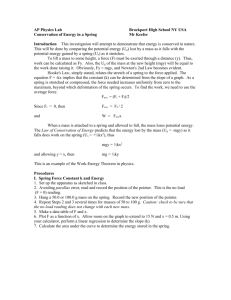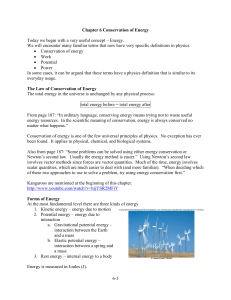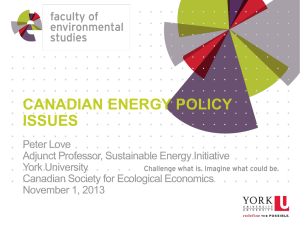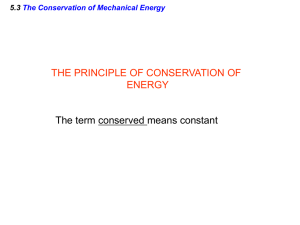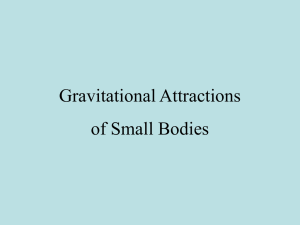chapter7
advertisement
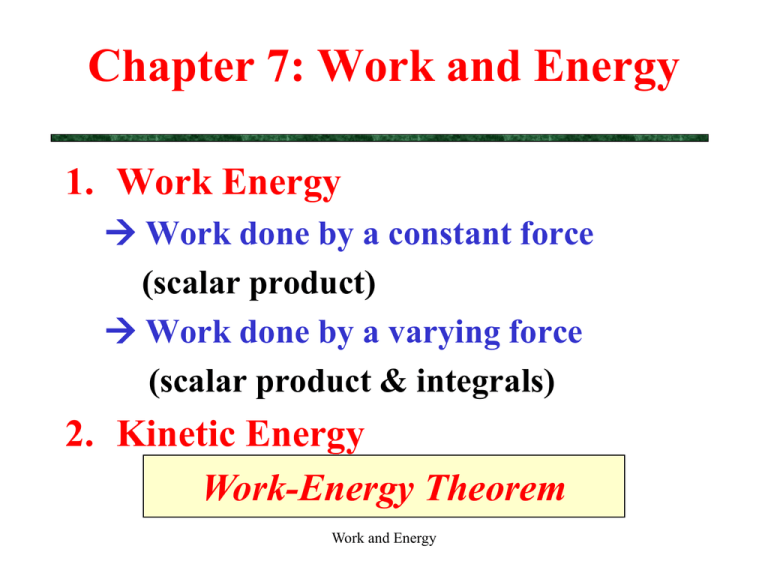
Chapter 7: Work and Energy 1. Work Energy Work done by a constant force (scalar product) Work done by a varying force (scalar product & integrals) 2. Kinetic Energy Work-Energy Theorem Work and Energy Forms of Mechanical Energy Work and Energy CONSERVATION OF ENERGY Work and Energy Work and Energy Work by a Baseball Pitcher A baseball pitcher is doing work on the ball as he exerts the force over a displacement. v1 = 0 v2 = 44 m/s Work and Energy Work done by several forces Work Done by a Constant Force (I) Work (W) How effective is the force in moving a body ? Both magnitude (F) and directions (q ) must be taken into account. W [Joule] = ( F cos q ) d Work and Energy Work Done by a Constant Force (II) Example: Work done on the bag by the person.. Special case: W = 0 J a) WP = FP d cos ( 90o ) b) Wg = m g d cos ( 90o ) Nothing to do with the motion Work and Energy Example 1A A 50.0-kg crate is pulled 40.0 m by a constant force exerted (FP = 100 N and q = 37.0o) by a person. A friction force Ff = 50.0 N is exerted to the crate. Determine the work done by each force acting on the crate. Work and Energy Example 1A (cont’d) WP = FP d cos ( 37o ) Wf = Ff d cos ( 180o ) Wg = m g d cos ( 90o ) WN = FN d cos ( 90o ) F.B.D. 180o d 90o Work and Energy Example 1A (cont’d) WP = 3195 [J] 180o Wf = -2000 [J] (< 0) Wg = 0 [J] WN = 0 [J] Work and Energy Example 1A (cont’d) Wnet = SWi = 1195 [J] (> 0) The body’s speed increases. Work and Energy Work-Energy Theorem Wnet = Fnet d = ( m a ) d = m [ (v2 2 – v1 2 ) / 2d ] d = (1/2) m v2 2 – (1/2) m v1 2 = K2 – K1 Work and Energy Example 2 A car traveling 60.0 km/h to can brake to a stop within a distance of 20.0 m. If the car is going twice as fast, 120 km/h, what is its stopping distance ? (a) (b) Work and Energy Example 2 (cont’d) (1) Wnet = F d(a) cos 180o = - F d(a) = 0 – m v(a)2 / 2 - F x (20.0 m) = - m (16.7 m/s)2 / 2 (2) Wnet = F d(b) cos 180o = - F d(b) = 0 – m v(b)2 / 2 - F x (? m) = - m (33.3 m/s)2 / 2 (3) F & m are common. Thus, ? = 80.0 m Work and Energy Work and Energy Satellite in a circular orbit Does the Earth do work on the satellite? Work and Energy B 2 Work and Energy Forces on a hammerhead F o r c e s Work and Energy S S23 Fn Work and Energy Spring Force (Hooke’s Law) Spring Force (Restoring Force): The spring exerts its force in the direction opposite the displacement. FS Natural Length FP x>0 x<0 FS(x) = - k x Work and Energy Work Done to Stretch a Spring FS FS(x) = - k x Natural Length W = x2 FP(x) dx x1 Work and Energy W FP Work and Energy Work Done by a Varying Force lb W = F|| dl la Work and Energy Example 1A A person pulls on the spring, stretching it 3.0 cm, which requires a maximum force of 75 N. How much work does the person do ? If, instead, the person compresses the spring 3.0 cm, how much work does the person do ? Work and Energy Example 1A (cont’d) (a) Find the spring constant k k = Fmax / xmax = (75 N) / (0.030 m) = 2.5 x 103 N/m (b) Then, the work done by the person is WP = (1/2) k xmax2 = 1.1 J (c) x2 = 0.030 m WP = FP(x) d x = 1.1 J x1 = 0 Work and Energy Example 1B A person pulls on the spring, stretching it 3.0 cm, which requires a maximum force of 75 N. How much work does the spring do ? If, instead, the person compresses the spring 3.0 cm, how much work does the spring do ? Work and Energy Example 1B (cont’d) (a) Find the spring constant k k = Fmax / xmax = (75 N) / (0.030 m) = 2.5 x 103 N/m (b) Then, the work done by the spring is x2 = -0.030 m WS = FS(x) d x = -1.1 J x1 = 0 (c) x2 = -0.030 m WS = -1.1 J Work and Energy Example 2 A 1.50-kg block is pushed against a spring (k = 250 N/m), compressing it 0.200 m, and released. What will be the speed of the block when it separates from the spring at x = 0? Assume mk = FS = - k x 0.300. (i) F.B.D. first ! (ii) x < 0 Work and Energy Example 2 (cont’d) (a) The work done by the spring is x2 = 0 m WS = FS(x) d x = +5.00 J x1 = -0.200 m (b) Wf = - mk FN (x2 – x1) = -4.41 (0 + 0.200) (c) Wnet = WS + Wf = 5.00 - 4.41 x 0.200 (d) Work-Energy Theorem: Wnet = K2 – K1 4.12 = (1/2) m v2 – 0 v = 2.34 m/s Work and Energy Potential Energy and Energy Conservation 1. Conservative/Nonconservative Forces Work along a path (Path integral) Work around any closed path (Path integral) 2. Potential Energy Mechanical Energy Conservation Energy Conservation Work Done by the Gravitational Force (I) Near the Earth’s surface W F dl (Path integral) l2 l1 y2 (-mg ˆj ) (dy ˆj ) y1 ( mgy ) y1 mgy1 mgy 2 y2 Energy Conservation y l Work Done by the Gravitational Force (II) Near the Earth’s surface W F dl y l2 (Path integral) l1 dl y2 (-mg ˆj ) (dx iˆ dy ˆj ) y1 ( mgy ) yy12 mgy1 mgy 2 Energy Conservation Work Done by the Gravitational Force (III) Wg < 0 if y2 > y1 Wg > 0 if y2 < y1 The work done by the gravitational force depends only on the initial and final positions.. Energy Conservation Work Done by the Gravitational Force (IV) Wg(ABCA) = Wg(AB) + Wg(BC) + Wg(CA) = mg(y1 – y2) + 0+ mg(y2- y1) =0 Energy Conservation C B dl A Energy Conservation Work Done by the Gravitational Force (V) Wg = 0 for a closed path The gravitational force is a conservative force. Energy Conservation Work Done by Ff (I) l2 ( L ) W f F f dl (Path integral) l1 ( 0 ) ( mmgl ) L - μmg L 0 L depends on the path. LB LA Energy Conservation Work Done by Ff (II) The work done by the friction force depends on the path length. Wf = 0 (any closed path) The friction force: (a) is a non-conservative force; (b) decreases mechanical energy of the system. Energy Conservation Example 1 A 1000-kg roller-coaster car moves from point A, to point B and then to point C. What is its gravitational potential energy at B and C relative to point A? Energy Conservation Wg(AC) = Ug(yA) – Ug(yC) Wg(ABC) = Wg(AB) + Wg(BC) = mg(yA- yB) + mg(yB - yC) = mg(yA - yC) y B A B dl C A Energy Conservation Climbing the Sear tower Work and Energy Power Work and Energy The Burj Khalifa is the largest man made structure in the world and was designed by Adrian Smith class of 1966 thebatt.com Febuary 25th
